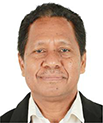Assessing the contribution of corporate social responsibility (CSR) initiatives of the oil and gas sector to sustainable development in Timor-Leste
Afonso Aleixo A * , David Close B , Katherine Jane Witt B and Anthony Paul Heynen CA
B
C

Afonso Aleixo holds a Master’s degree in Development Management from AIM Philippines and is the Director of the Católica Business School – Universidade Católica Timorense (UCT) St. João Paulo II, Timor-Leste. He worked professionally for almost 20 years with the Timorese Government, international organisations, development agencies, the UN, and others. Since 2023, he has been involved in the UCT research team for the socio-economics area and published some articles in reputable journals. |

David Close is the Director of the Gas & Energy Transition Centre and an industry Professor at the University of Queensland. He is a Geoscientist and energy industry executive. |

Katherine Jane Witt is an Associate Professor at the University of Queensland and Chair in Social Performance at the Gas & Energy Transition Research Centre. |

Dr Anthony Heynen is a Senior Lecturer in the School of Chemical Engineering, University of Queensland, and Program Coordinator for UQ’s Sustainable Energy postgraduate program. |
Abstract
Timor-Leste has reaped the benefits of its offshore oil and gas revenue for almost two decades – the result of the partnerships between the Government of Timor-Leste and oil and gas operators. To gain and maintain a social license to operate (SLO), voluntary corporate social responsibility (CSR) practices have been conducted in parallel to oil and gas extraction. Limited research that seeks to understand and demonstrate the benefits and challenges of CSR practices has previously been published. This paper aims to address this gap by examining the effectiveness of Timor-Leste CSR efforts by oil and gas operators. The research uses a qualitative multi-case design approach and semi-structured interviews to identify and understand the scope of CSR practice and its socio-economic effectiveness using a framework from the United Nations’ sustainable development goals (SDGs). The result demonstrates that CSR initiatives are socio-economically effective and benefit Timor-Leste. Conversely, CSR financial benefits are less easily assessed, and insufficient efforts concerning specific SDGs, e.g. Goal 7 for Affordable and Clean Energy. The government must strictly regulate effective local content practices.
Keywords: corporate, effectiveness, oil and gas sector, social development, social responsibility, socio-economics benefit, sustainability, Timor-Leste.
 Afonso Aleixo holds a Master’s degree in Development Management from AIM Philippines and is the Director of the Católica Business School – Universidade Católica Timorense (UCT) St. João Paulo II, Timor-Leste. He worked professionally for almost 20 years with the Timorese Government, international organisations, development agencies, the UN, and others. Since 2023, he has been involved in the UCT research team for the socio-economics area and published some articles in reputable journals. |
 David Close is the Director of the Gas & Energy Transition Centre and an industry Professor at the University of Queensland. He is a Geoscientist and energy industry executive. |
 Katherine Jane Witt is an Associate Professor at the University of Queensland and Chair in Social Performance at the Gas & Energy Transition Research Centre. |
 Dr Anthony Heynen is a Senior Lecturer in the School of Chemical Engineering, University of Queensland, and Program Coordinator for UQ’s Sustainable Energy postgraduate program. |
References
Buldybayeva G (2014) Both sides of CSR practice: a case from oil and gas industry in Kazakhstan. Acta Polytechnica Hungarica 11(2), 229-248.
| Google Scholar |
Fallah Shayan N, Mohabbati-Kalejahi N, Alavi S, Zahed MA (2022) Sustainable development goals (SDGs) as a framework for corporate social responsibility (CSR). Sustainability 14(3), 1222.
| Crossref | Google Scholar |
Ishan SS, Ramakrishnan S, Keong LB, Umar A (2017) The concept of corporate social responsibility (CSR)—A review of the literature. Advanced Science Letters 23(9), 9287-9290.
| Crossref | Google Scholar |
Jamali D (2010) The CSR of MNC Subsidiaries in Developing Countries: Global, Local, Substantive or Diluted? Journal of Business Ethics 93(Suppl 2), 181-200.
| Crossref | Google Scholar |
Kemp D, Owen JR, Van de Graff S (2012) Corporate social responsibility, mining and ‘audit culture’. Journal of Cleaner Production 24, 1-10.
| Crossref | Google Scholar |
Long FJ, Arnold MB (1995) Gaining Competitive Advantage Through Environmental Investments. Business Horizons 38, 37-47.
| Crossref | Google Scholar |
Najeminur N, Supriadi A, Syam H (2021) The Effectiveness Of Corporate Social Responsibility At Energy Equity Epic Sengkang Pty. Jurnal Riset Ekonomi Dan Bisnis 16(1), 41-56.
| Crossref | Google Scholar |
Oshioste EE, Okoye CC, Udokwu STC (2023) The effectiveness of CSR in sustainable development: a case study of Total’s oil exploration activities in the Niger-Delta region. Economic Growth and Environment Sustainability 2(2), 57-65.
| Crossref | Google Scholar |
Porter ME, Kramer MR (2006) Strategy and society: the link between competitive advantage and corporate social responsibility. Harvard Business Review 84(12), 78-92.
| Google Scholar | PubMed |
Simionescu LN (2015) The relationship between corporate social responsibility (CSR) and sustainable development (SD). Internal Auditing & Risk Management 10(2), 179-190.
| Google Scholar |
Warnaars XS (2012) Why be poor when we can be rich? Constructing responsible mining in El Pangui, Ecuador. Resources Policy 37(2), 223-232.
| Crossref | Google Scholar |


